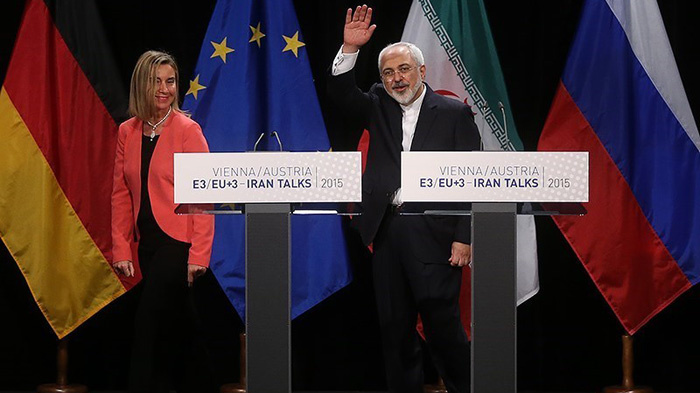Zarif Declares Attainment of Agreement with Powers

Zarif thanked all those who played a role in resolving the Iran-West nuclear standoff, including the Austrian government and IAEA.
"We, the EU foreign policy chief and the foreign ministers of the Islamic Republic of Iran, China, France, US, Germany, Britain and Russia, welcome the Joint Comprehensive Plan of Action that guarantees the fully peaceful nature of Iran's nuclear program," he said.
He said that Iran and the Group 5+1 (the five permanent UN Security Council members and Germany) have ratified a Joint Comprehensive Plan of Action that ensures the path ahead for cooperation.
"The JCPOA includes removal of all sanctions, including banking, financial and energy embargoes," he said.
He said the agreement includes the JCPOA along with five annexes, including one on sanctions and another one on nuclear cooperation.
Zarif said the text will be approved by the UN Security Council in coming days.
"The Islamic Republic of Iran reiterates the peaceful nature of its nuclear program," the foreign minister said.
"What we declare today is not just an agreement, but a good one, which will provide good opportunity for global peace," Zarif added.
"We are committed to fulfill this program in full and ask the IAEA to help us in its implementation, and ask the international community to support us," he stressed.
The document is 159 pages. you may find the entire JCPOA and its annexes here: ![]()
Iran and the six world powers have come into terms with each other in a sum-up agreement that will include the following points.
The hitherto elusive agreement was finally nailed down on Tuesday in the ritzy Palais Coburg Hotel in the Austrian capital of Vienna, where negotiators from Iran and the six other countries had recently been spending over two weeks to work out the remaining technical and political issues.
The terms of the agreement
The agreement, the Joint Comprehensive Plan of Action (JCPOA), will, according to Iranian officials, be presented to the United Nations Security Council (UNSC), which will adopt a resolution in seven to 10 days making the JCPOA an official document.
Based on the agreement, which has been concluded with due regard for Iran’s red lines, the world powers recognize Iran’s civilian nuclear program, including the country’s right to the complete nuclear cycle.
The UNSC sanctions against the Islamic Republic, including all economic and financial bans, will be lifted at once under a mutually agreed framework and through a new UN resolution.
None of the Iranian nuclear facilities will be dismantled or decomissioned.
Furthermore, nuclear research and development activities on all types of centrifuges, including advanced IR-6 and IR-8 machines, will continue.
The nuclear-related economic and financial restrictions imposed by the United States and the European Union (EU) targeting the Iranian banking, financial, oil, gas, petrochemical, trade, insurance and transport sectors will at once be annulled with the beginning of the implementation of the agreement.
The arms embargo imposed against the Islamic Republic will be annulled and replaced with certain restrictions, which themselves will be entirely removed after a period of five years.
Additionally, tens of billions of dollars in Iranian revenue frozen in foreign banks will be unblocked.
A total of 800 natural persons and legal entities, including the Central Bank of Iran (CBI), the Islamic Republic of Iran Shipping Lines and the National Iranian Oil Company (NIOC), will be taken off sanctions lists.
Following several extensions of official and unofficial deadlines in the latest round of the nuclear negotiations, there were increasing signs that an agreement was imminent on Tuesday.
Meantime, Iran and the IAEA signed a roadmap. The head of the International Atomic Energy Agency said a "roadmap" has been signed between the IAEA and Iran as a final agreement has been struck over the Islamic Republic's nuclear program.
Yukiya Amano, the head of the International Atomic Energy Agency, made the comments in Vienna on Tuesday, just a short time after diplomats acknowledged a sum-up agreement had been made between world powers and Iran.
Amano said Iranian Vice President Ali Akbar Salehi signed the roadmap. It calls for his agency, with Iran's cooperation, to make an assessment of issues relating to what is called as possible military dimensions of the Islamic Republic's nuclear program by the end of 2015.
"This is a significant step forward toward clarifying outstanding issues regarding Iran's nuclear program," Amano said.

